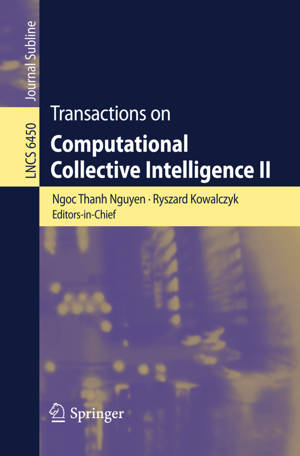
Je cadeautjes zeker op tijd in huis hebben voor de feestdagen? Kom langs in onze winkels en vind het perfecte geschenk!
- Afhalen na 1 uur in een winkel met voorraad
- Gratis thuislevering in België vanaf € 30
- Ruim aanbod met 7 miljoen producten
Je cadeautjes zeker op tijd in huis hebben voor de feestdagen? Kom langs in onze winkels en vind het perfecte geschenk!
- Afhalen na 1 uur in een winkel met voorraad
- Gratis thuislevering in België vanaf € 30
- Ruim aanbod met 7 miljoen producten
Zoeken
Transactions on Computational Collective Intelligence II
Paperback | Engels | Lecture Notes in Computer Science | Transactions on Computational Collective Intelligence | nr. 6450
€ 83,95
+ 167 punten
Omschrijving
Welcome to the second volume of Transactions on Computational Collective Intel- gence (TCCI), a new journal devoted to research in computer-based methods of c- putational collective intelligence (CCI) and their applications in a wide range of fields such as the Semantic Web, social networks and multi-agent systems. TCCI strives to cover new methodological, theoretical and practical aspects of CCI understood as the form of intelligence that emerges from the collaboration and competition of many individuals (artificial and/or natural). The application of multiple computational int- ligence technologies such as fuzzy systems, evolutionary computation, neural s- tems, consensus theory, etc., aims to support human and other collective intelligence and to create new forms of CCI in natural and/or artificial systems. TCCI is a double-blind refereed and authoritative reference dealing with the wo- ing potential of CCI methodologies and applications, as well as emerging issues of interest to academics and practitioners. This second issue contains a collection of 10 articles selected from high-quality submissions addressing advances in the foun- tions and applications of computational collective intelligence. In "Integration P- posal for Description Logic and Attributive Logic - Towards Semantic Web Rules" G. Nalepa and W. Furmanska propose a transition from attributive logic to description logic in order to improve the design of Semantic Web rules. K. Thorisson et al.
Specificaties
Betrokkenen
- Uitgeverij:
Inhoud
- Aantal bladzijden:
- 197
- Taal:
- Engels
- Reeks:
- Reeksnummer:
- nr. 6450
Eigenschappen
- Productcode (EAN):
- 9783642171543
- Verschijningsdatum:
- 16/11/2010
- Uitvoering:
- Paperback
- Formaat:
- Trade paperback (VS)
- Afmetingen:
- 155 mm x 236 mm
- Gewicht:
- 317 g

Alleen bij Standaard Boekhandel
+ 167 punten op je klantenkaart van Standaard Boekhandel
Beoordelingen
We publiceren alleen reviews die voldoen aan de voorwaarden voor reviews. Bekijk onze voorwaarden voor reviews.








